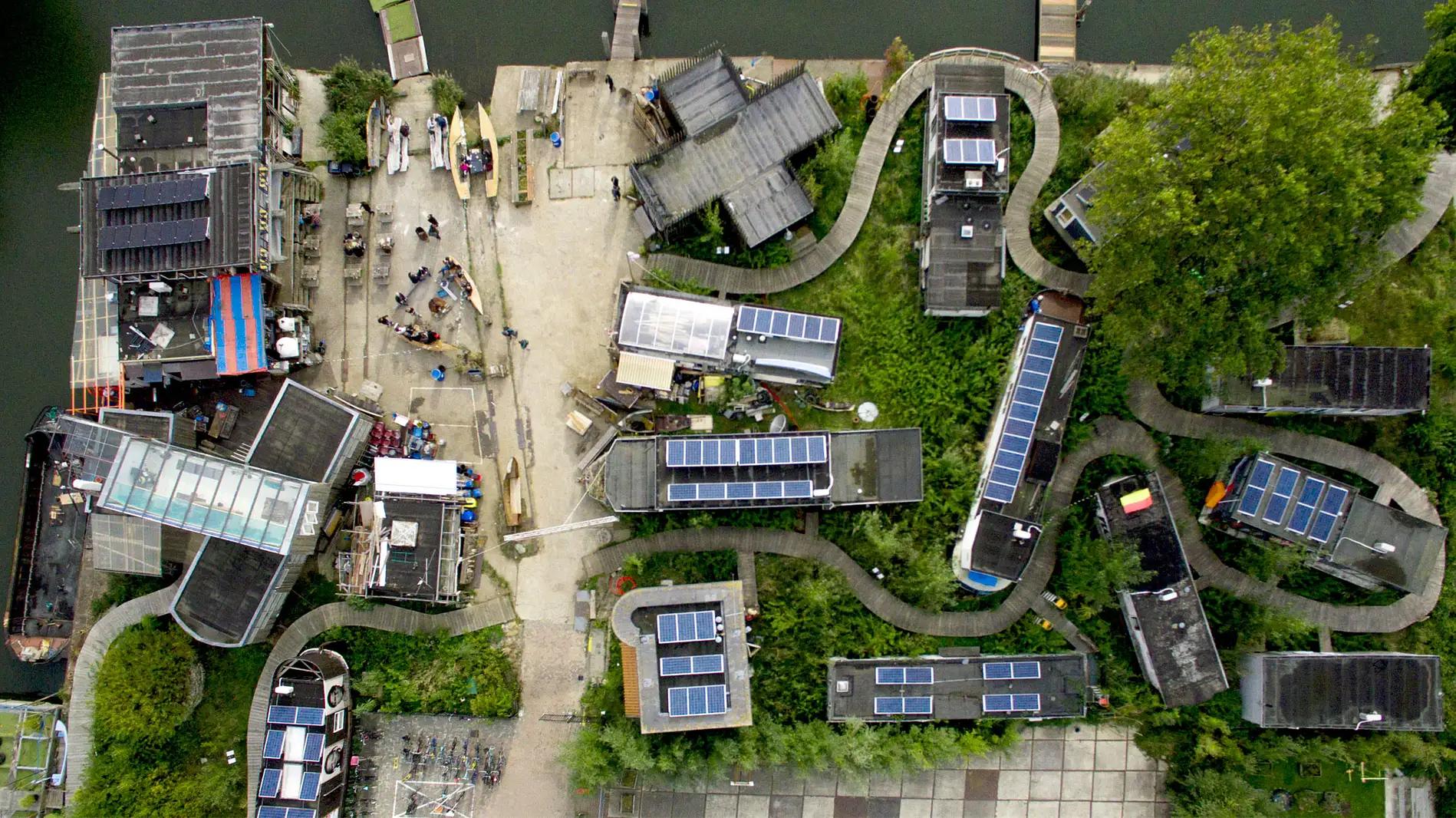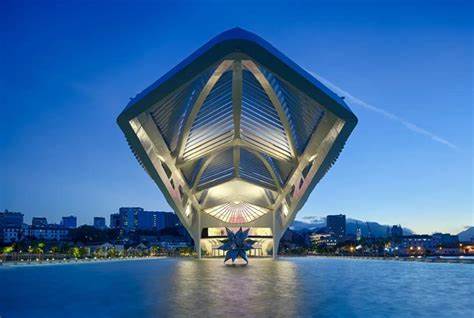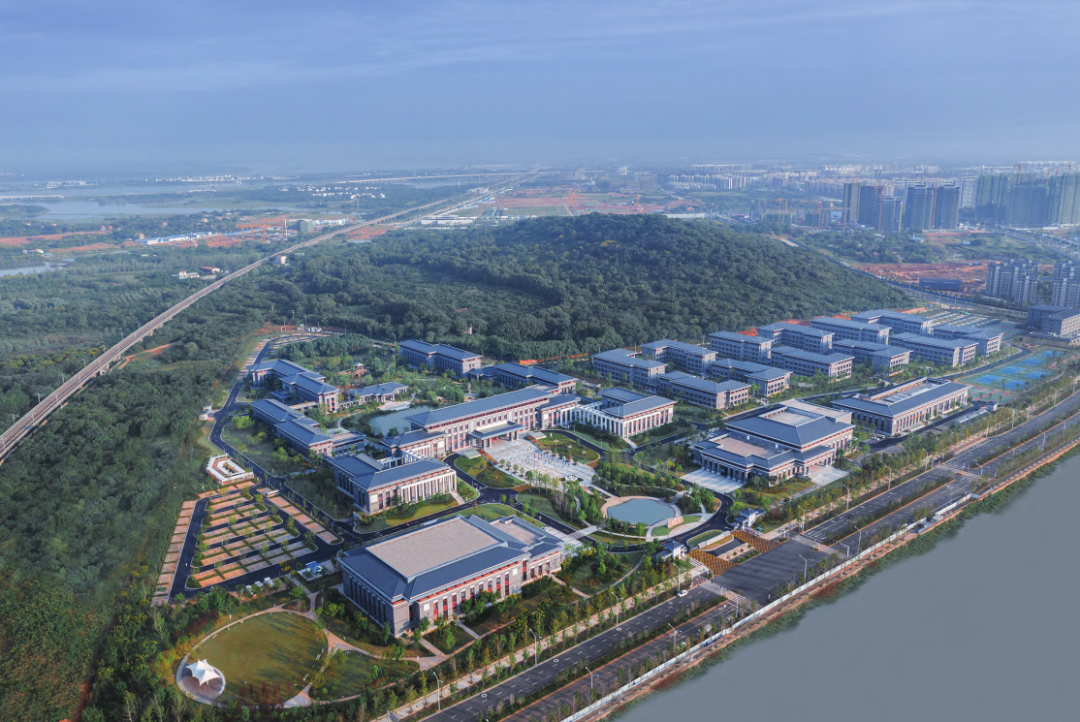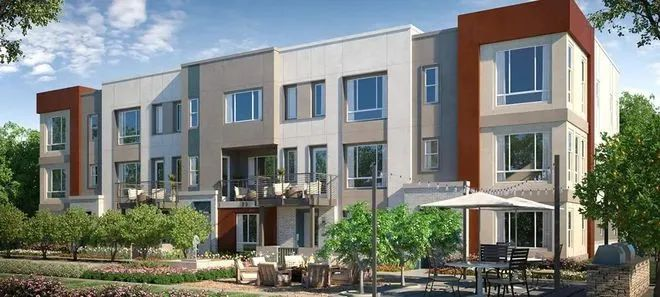

 登录
登录



 返回
返回
De Ceuvel是一个可持续的办公园区,建在阿姆斯特丹北部的一家前造船厂的原址上,已成为国际知名的循环经济案例研究。该场地拥有17个工作空间和一个社区咖啡馆,成为“清洁技术游乐场”,拥有许多技术和资源回收的案例。
挑战
将污染严重的城市地块变成繁荣的循环生活实验室
为了将后工业区转变为混合用途的住宅和商业区,阿姆斯特丹市授予了四块土地,以倡导可持续发展和循环城市发展的开创性举措。2012年,Metabolic和一些组织赢得了一项招标,将De Ceuvel遗址 ( 以前是一个废弃和污染的造船厂)变成一个“再生城市绿洲”,目的是激发我们如何管理社区资源的新思维方式。
与合作伙伴一起,Metabolic团队着手寻找实用和创造性的解决方案,以建立一个圆形城市中心,并牢记以下几点:
- 当地社区的具体需求和利益
- 由于多年的工业活动而严重污染的土地
- 最低的施工和运营预算
- 有关棕地修复、废物处理和水电管理的城市法规
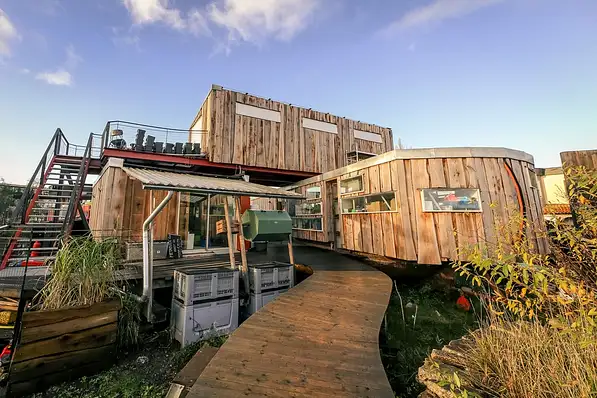
我们的方法
设计清洁技术游乐场
Metabolic被要求为De Ceuvel提供可持续性总体规划,与一大群合作伙伴,企业家和志愿者合作改造该地区。通过将17艘旧船屋升级改造到建筑物中,使用专门的植物来清洁土壤,并安装低成本的清洁技术以使开发项目的资源管理尽可能循环,我们帮助该市将一个破旧和污染的地区转变为现在的可持续社区中心,工作空间以及可持续发展和循环经济教育的地方。
该场地旨在容纳约30家公司的办公室,包括代谢实验室 - 研讨会和大师班的学习中心 - 现场咖啡馆,以及鱼菜共生温室,为咖啡馆提供微绿色。每艘船屋顶上的太阳能电池板产生电力,这些电力通过微电网在船只之间共享,每艘船的灰水通过天然基质过滤,因此可以作为灌溉植物的水。每艘船屋的卫生设施都旨在促进有机废物的收集,这些废物可以被送入生物除尘器和鸟粪石反应器中,从中可以为温室提取有价值的营养物质。
在空间的文化中,租用船屋改建办公室的创意和社会企业已经接受了一个更具可持续性和循环性的社区的集体理想和愿景。这与来自周围社区的人们的能量和热情相辅相成,他们被鼓励使用De Ceuvel作为文化和社区中心,聚集在一起,享受共享的体验,并参与创意项目。
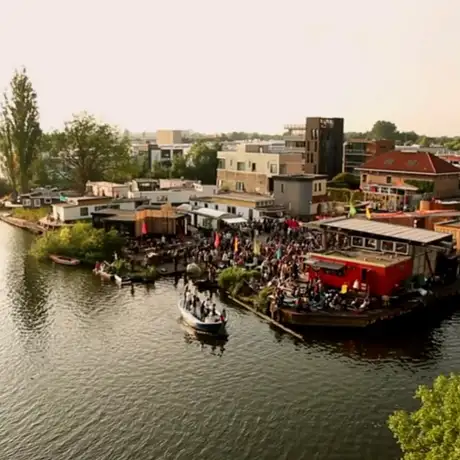
成果
循环实验的展示
De Ceuvel是循环实验的蓝图,展示了城市闭环思维在行动。自2012年构思以来,该项目为该地区带来了巨大的国家和国际利益和收入。在新冠疫情之前,每年接待超过35,000名游客,从年轻学生到老一辈的公用事业和当地人,欢迎学生,政策制定者和企业等。
它也已成为阿姆斯特丹应用可持续性和可扩展解决方案的重要展示和研究中心,赢得了许多可持续发展创新奖项。它的实验性质培养多样性,分享专业知识,并为开源知识做出贡献。它通过树立一个积极的榜样,每年激励成千上万的游客,为生活带来城市资源供应的替代方法。
De Ceuvel 是阿姆斯特丹可见的循环开发开始的地方。 它在 2014 年的成功诞生,连同邻近的可持续浮动村庄 Schoonschip 的概念化,促使签署了一个完全循环的 Buiksloterham 的多合作伙伴清单。 该市对循环城市发展的关注不断加强,目前重点开展了多项举措,其中之一是考虑城市地块开发的循环招标程序,这有可能改变整个城市的发展模式。
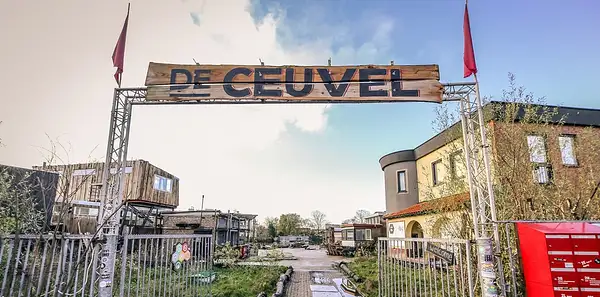
能量和营养物质在DE CEUVEL流动:
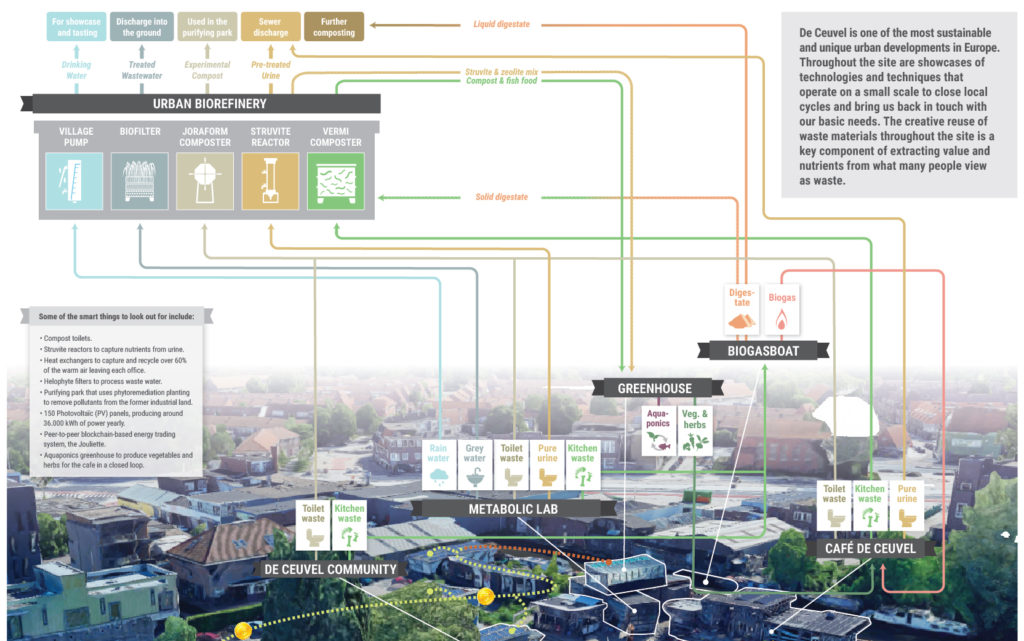
DE CEUVEL可持续技术概述:
空气质量计
Since August 2021 an air quality meter has been installed on the roof of Café de Ceuvel. The project SOOPS has placed these meters at various locations in and around Amsterdam. This way they try to give a clearer picture of the current air quality.
Air quality has attracted increasing attention in recent years. Scientific research has shown that the air's quality has a huge influence on all living organisms. In many places in the Netherlands, they already measure the air quality and, in particular, the level of pollution. However, there is much uncertainty about this pollution and also about the interpretation of the measurements. These calculations differ considerably depending on the interest group.
To provide a more insightful picture of the measurements, SOOPS started an air measurement project. Cooperation was sought with the GGD and RIVM because these organisations already have a large number of measurement points. In the first set-up, the situation in Amsterdam-Noord was examined. After selecting a suitable supplier and calibrating the measuring stations, a number of them were installed.
The results of the measurements are displayed on the website nox.soops.nl. Here you can also see what data are being measured. Apart from temperature, wind and wind direction, humidity, the following gases and pollutants are measured: CO2, SO2, CO, NO2, O3, NO, NH3 and particulate matter PM2.5 and PM10.
循环模式
De Ceuvel is situated in the old industrial area Buiksloterham and is one of the pioneers in the transformation of this polluted zone into a sustainable residential area. Metabolic together with the Municipality of Amsterdam, several real-estate developers, Waternet and many others involved in BSH have signed the Manifest Circulair Buiksloterham.
As a consequence of this covenant, many sustainable projects are being realized in the area around de Ceuvel, amongst which many DIY buildings, sustainable living on the water Schoonschip, PEK Ecostroom and Waternet's bio-refinery. Buiksloterham is on its way to become Europe's most sustainable neighborhood and at de Ceuvel we're very proud to be in the vanguard of this development.
Citylab article - The Atlantic (2016)
http://buiksloterham.nl/
厕所堆肥
Due to the pollution of de Ceuvel grounds, it was impossible to dig in order to lay a sewage system. Instead, each boat on De Ceuvel is equipped with a compost toilet. Waste is collected and pre-composts in the toilets before it is brought to our tumbling composter for further composting.
While conventional flushing toilets produce wastewater discharged to the sewer, dry toilets do not use water for flushing and produce solid compost. Because reusing human waste comes with risks, we have conducted research on the quality of these fertilizers on different parameters, such as metals, pathogens and medicine residues, and which treatment steps and production methods can be applied to best harvest the nutritional value.
*NB The Café and the Crossboat do have standard flush toilets installed
热交换器
Each office boat has a heat pump and an air-to-air heat exchange ventilation system. As warm air leaves the boat, over 60% of the heat is captured and circulated back inside.
The heat pump extracts heat from the surrounding air to heat up each boat. These simple technologies allowed us to circumvent the need for a gas connection and use renewable electricity to power the heating needs of each boat.
过滤器
We process wastewater from kitchen sinks in decentralized helophyte filtration systems placed adjacent to each office-houseboat. Helophyte filters are simple constructions built using different layers.
Sand, gravel, and shells help remove solids, and a mix of special plants consumes organic matter like nitrogen and phosphorus. Once purified, clean water is then discharged into the ground.
植物修复
Like many areas of Buiksloterham, the area underneath de Ceuvel is polluted by almost a century of heavy industry. Normally such polluted ground is removed and mixed with clean ground, thus moving the problem to another space. At De Ceuvel we want to handle this differently, a ‘forbidden garden’ was designed by DELVA Landscape Architects using plants that are known to be particularly good at absorbing these pollutants through their roots, a simple technique with a complex name: ‘phytoremediation’.
The soil between our boats is cultivated and maintained as a Zuiverend Park (Purifying Park): a green environment that grows specific sets of plants, which absorb, stabilize or exhaust high concentrations of pollution. To protect both human- and plant-health, we built a raised jetty over the park. Eventually the plants will help us to leave the ground much cleaner than we initially found it, while in the meantime, as De Ceuvel demonstrates, there can be other uses for the space.
Until today, the practice of phytoremediation has only limitedly been used for small, urban areas. Zuiverend Park is part of the unique ‘Cleantech Playground’ belonging to De Ceuvel: we aim to increase our knowledge of this technique in order to improve it, and, ultimately, to transfer our experiences to a larger audience. Due to this learning process, our way of cultivating and maintaining the park develops over time. Now, in 2017, the original plan (designed by the Delva Landscape Architects in 2014) has only left us with the willows, poplars and some grasses. Since 2016 we have been taking a closer look at the plants that spontaneously stem from the polluted soil. We carefully examine their use for phytoremediation, while simultaneously sowing plants that are already known for their metal absorbing qualities. This combination seems to work out really well!
独创的植物净化组合:
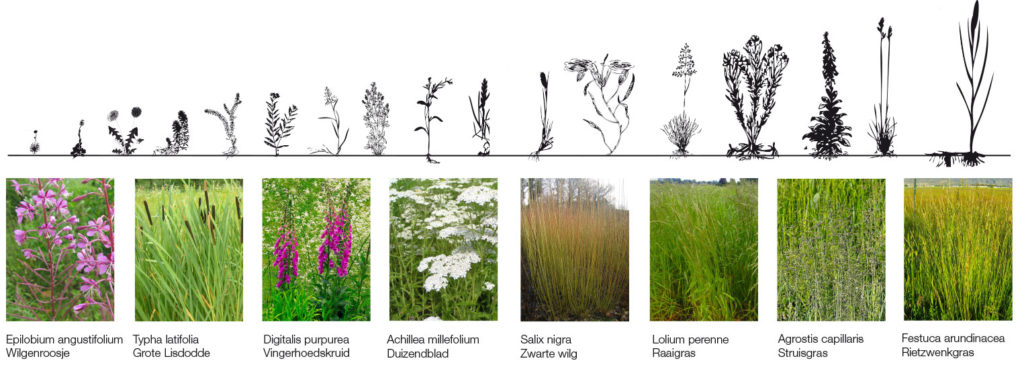
Do you want to help and learn more about phytoremediation?
On the 3rd Wednesday of every month, a group of volunteers attend to the park. You are more than welcome to join one of these fun, relaxing parkdays -- whether you have green fingers or not! We start at 13.00 with a small guided tour and more information about phytoremediation. From 13:30-16:30 we work (and play) in the park. Sign up via zuiverendpark@deceuvel.nl or just visit De Ceuvel during one of the parkdays.
太阳能 & 加密货币”朱丽叶“
De Ceuvel is equipped with over 150 Photovoltaïc (PV) panels that generate energy from the sun. The panels are installed on the majority of the office boats and produce around 36.000 kWh of power yearly.
This covers the electricity demand of the heating systems of the offices, along with a part of the remaining electricity needs. The rest of our power is supplied by a green energy supplier.
Crypto-Currency 'Jouliette'
In September 2017, Spectral Utilities (daughtercompany of Metabolic) introduced a new crypto-currency on De Ceuvel, named after the Joule, the international unit of energy. The Jouliette uses energy production as a starting point. Mining existing crypto-currencies such as Bitcoin consumes a lot of energy, while the Jouliette is generated by the user producing excess solar energy.
Jouliette stimulates the local production and exchange of renewable and so contributes to the energy transition and the local economy. It encourages solarpanel owners to exchange energy locally, instead of selling surplus power to the grid. De creation of new Jouliette's is simple, transparant en based on smart meters. Through blockchain technology, points are generated and distributed among De Ceuvel community, and users are rewarded for smart and efficient usage of power and solarpanels. The Jouliettes can then be traded for power when needed, or for other things as well. The goal is to connect all of the Buiksloterham neighborhood to create a local smart grid.
太阳能
De Ceuvel is equipped with over 150 Photovoltaïc (PV) panels that generate energy from the sun. The panels are installed on the majority of the office boats and produce around 36.000 kWh of power yearly.
This covers the electricity demand of the heating systems of the offices, along with a part of the remaining electricity needs. The rest of our power is supplied by a green energy supplier.
鸟粪石反应器
Organic waste streams including food and human waste contain nutrients necessary for plant growth. The effective use of these nutrient streams as fertilizer for urban agriculture can help close the nutrient cycle on local and urban levels. At de Ceuvel, we investigate methods for recovering nutrients from urine.
Separated urine is collected from Metabolic Lab and Café de Ceuvel men's urinoir, from which phosphate is recovered by using a struvite reactor. These phosphate crystals can then be combined with other local inputs and used as a fertilizer for local food production.
沼气船
Unfortunately we've decided in february 2019 to stop the project Biogasboat after several setbacks
Read more about our decision to stop this project here:
https://deceuvel.nl/en/project-biogasboot-gestopt/
---------------------------------------------
Old description of the project:
Café de Ceuvel is currently building the world’s very first Biogas Boat. This boat has the ability to convert organic waste into biogas that will be used to cook with in the restaurant. In this way, de Ceuvel is taking its next step towards its mission to close as many loops as possible and to reduce its waste production, contributing to an increasingly sustainable circular economy.
In the Biogasboat, we are building a biodigester that converts all the organic waste produced at de Ceuvel into biogas, which can be used to cook with. The remaining digestate is a rich source of nutrients for plants and insects. The most important aim of the Biogas Boat is to close the loop of organic matter while inspiring guests and other entrepreneurs.
And it is all in the name: as you might have figured, the Biogas Boat can sail! In the nearby future, she will go from festival to festival to collect organic matter to convert it into gas and fuel, thereby showing the larger audience the great potential of waste.
http://www.biogasboot.nl
升级改造
De Ceuvel has been built largely out of recycled materials. Old houseboats that would have been demolished have been upcycled into creative, energy-efficient workspaces, using secondhand materials from all over the Netherlands. And of course, we make sure to separate all our waste: glass, plastic, paper, organic waste, and rest.
Upcycling is an important part of our philosophy as well as the visual aesthetic of de Ceuvel. The Logic Works workspace across from the Café regularly cranks out newly upcycled furniture using old industrial metals and wooden panes, and benches made from old boats.
http://www.logic.works/
水培温室
The greenhouse is the key to recycling nutrients at De Ceuvel. The greenhouse at De Ceuvel produces vegetables and herbs for Cafe de Ceuvel using a closed-loop aquaponics system combining fish and vegetable production.
The fish excretes are broken down into nutrients for the plants, and the plants provide a natural filter for the water the fish live in. Aquaponics is thus based on the natural symbiosis between plant and water life. Inputs include primarily local nutrients like worms from our composting bins, and struvite from our struvite reactor, produced by men's urine from the Café. In the future, we will be experimenting with algae and insect production.
 0
0
 1901
1901

0
收藏
 0
0
 1901
1901
提交评论
相关内容


 我的文章
我的文章
 我的收藏
我的收藏
 我的统计
我的统计
 我的消息
我的消息
 我的设置
我的设置
